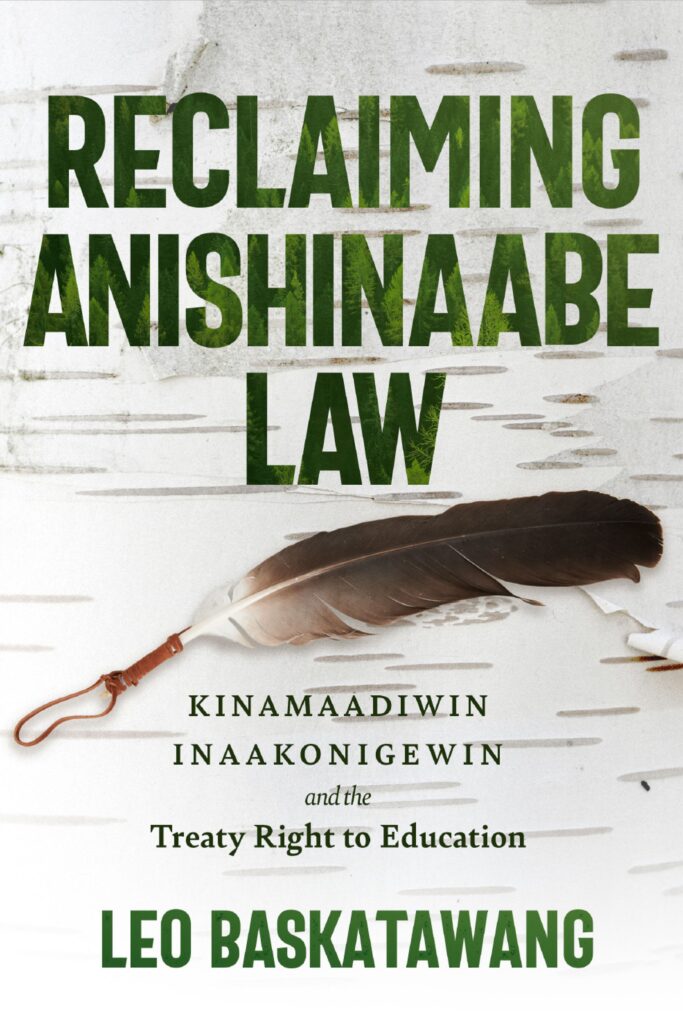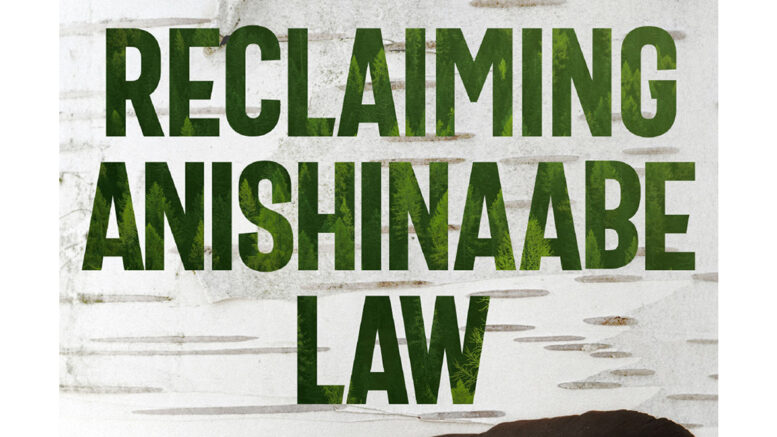Reviewed by Rob Houle, Local Journalism Initiative Reporter
(ANNews) – For many communities across Turtle Island the struggle for self-determination includes the removal and replacement of foreign practices. Until recently, the solution to these problems was purported to be a recreation or enactment of new Indigenous laws. Additionally, many government programs and funding streams have focused on creating new and modern relationships, seemingly casting the foundational relationships of Canada to the wayside. In his book, Reclaiming Anishinaabae Law: Kinamaadiwin Inaakonigewin and the Treaty Right to Education, Dr. Leo Baskatawang encourages the reader to look to the past for answers to future questions.
 Guiding the reader through decades of history while paralleling his own experiences in Education work, Baskatawang manages to not only humanise the information but reflect how connected things are in Indian Country. By drawing these comparisons, he begins to put forward the argument that a prosperous future for Indigenous and non-Indigenous Canadians lies in a reinvigoration of Treaty terms, and specifically Treaty No. 3. Separated into four distinct chapters, Reclaiming Anishinaabae Law serves as not only an education tool, but also a roadmap for other communities wishing to reclaim and understand their Treaty Right to Education.
Guiding the reader through decades of history while paralleling his own experiences in Education work, Baskatawang manages to not only humanise the information but reflect how connected things are in Indian Country. By drawing these comparisons, he begins to put forward the argument that a prosperous future for Indigenous and non-Indigenous Canadians lies in a reinvigoration of Treaty terms, and specifically Treaty No. 3. Separated into four distinct chapters, Reclaiming Anishinaabae Law serves as not only an education tool, but also a roadmap for other communities wishing to reclaim and understand their Treaty Right to Education.
As has become a standard process for those wishing to educate non-Indigenous people, Dr. Baskatawang begins with a brief history of Colonisation, Western Expansion and the Treaty making process in Canada. This approach seeks to not only bring the reader up to speed as to how we got to where we are, but also introduce them to scholars who have written about the issues for some time. Namely the likes of Fanon, Friere, Burrows, Cardinal and Simpson to name a few. In doing so, the author not only provides the reader with a laundry list of future required readings, but also solidifies his position as one that is rooted in deep thought and scholarship.
Progressing through the book is very much a journey through the eyes of a Treaty person. The perspectives offered paint imagery of more happening behind the scribbles on the parchment, and that a deeper connection existed at the time of negotiation. Dr. Baskatawang once again hammers home that the written text of Treaty No. 3 is not the only authority, but that a holistic approach to interpreting our Rights is necessary to fully achieve Kinamaadiwin Inaakonigewin, or an Anishinaabae Education Law.
Throughout his book, Dr. Baskatawang approaches many important topics and issues with a double edged approach. While positive in some circles, situations and achievements may be viewed with some scrutiny by others. Reconciliation remains one such topic, and by reflecting on the events of recent years, the author highlights how often First Nations must take the good with the bad. As a shining example, Baskatawang highlights the “[irony] that the pope’s apology came on April Fools Day”. Regardless, it is often this lighthearted approach to our history and mistreatment that has allowed Indigenous people to continue to push forward.
With foundations and scholarship like that of Reclaiming Anishinaabae Law, the journey towards self-determination appears closer at hand. The days of Government and non-Indigenous people prescribing our next steps seems like a less viable option. Indigenous people can begin to lean and rely upon each other once again, as they had prior to Colonisation. It is within this sense of community that we can truly begin to understand Kinamaadiwin Inaakonigewin and like laws, breathe new life into old practices and reestablish tradition at the centre of our governance models.
Reclaiming Anishinaabae Law: Kinamaadiwin Inaakonigewin and the Treaty Right to Education, (Paper, ISBN: 97817728) was published in March 2023 by University of Manitoba Press.



My favorite book, hands down. Congratulations Dr. Baskatawang!